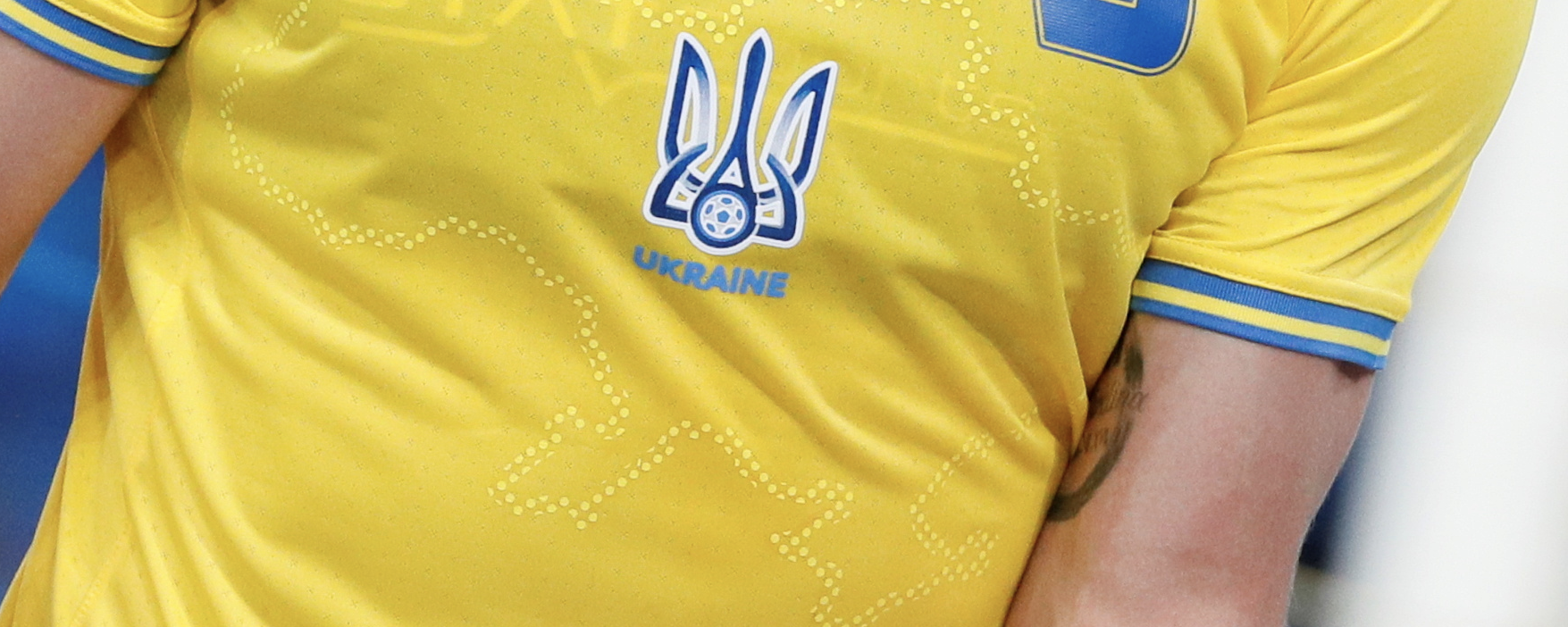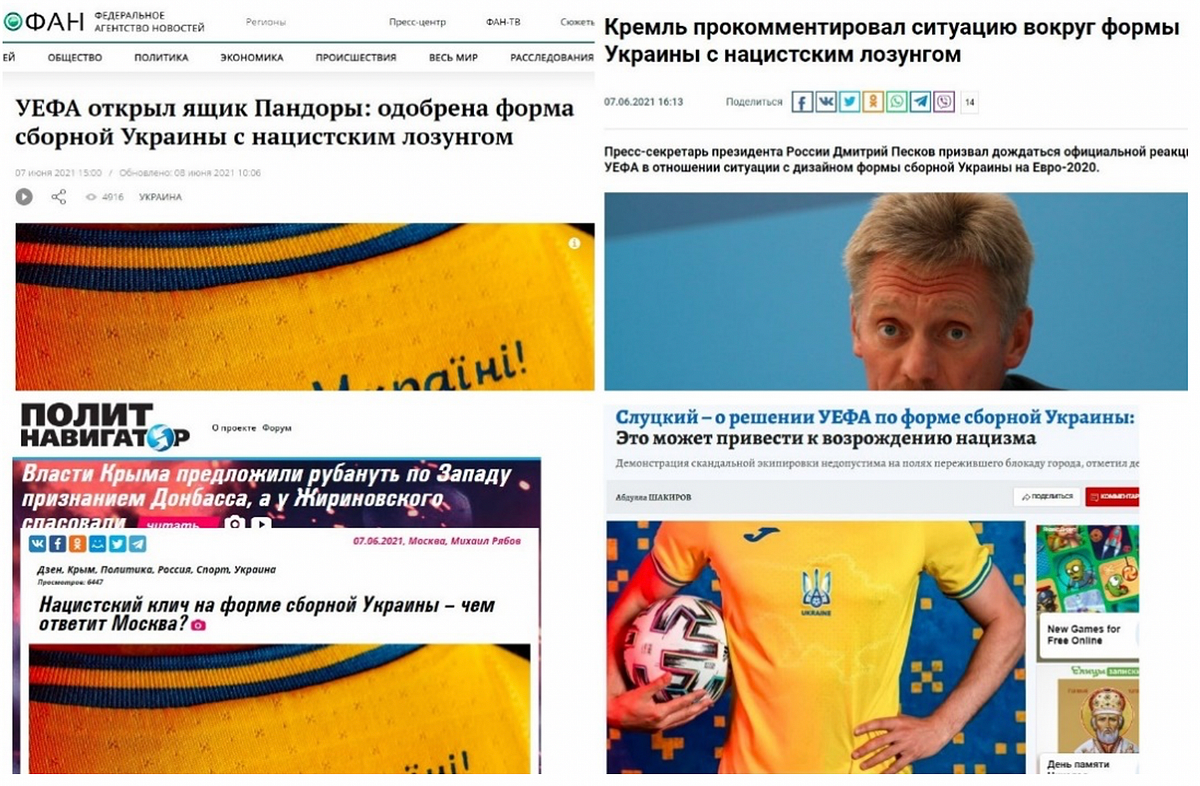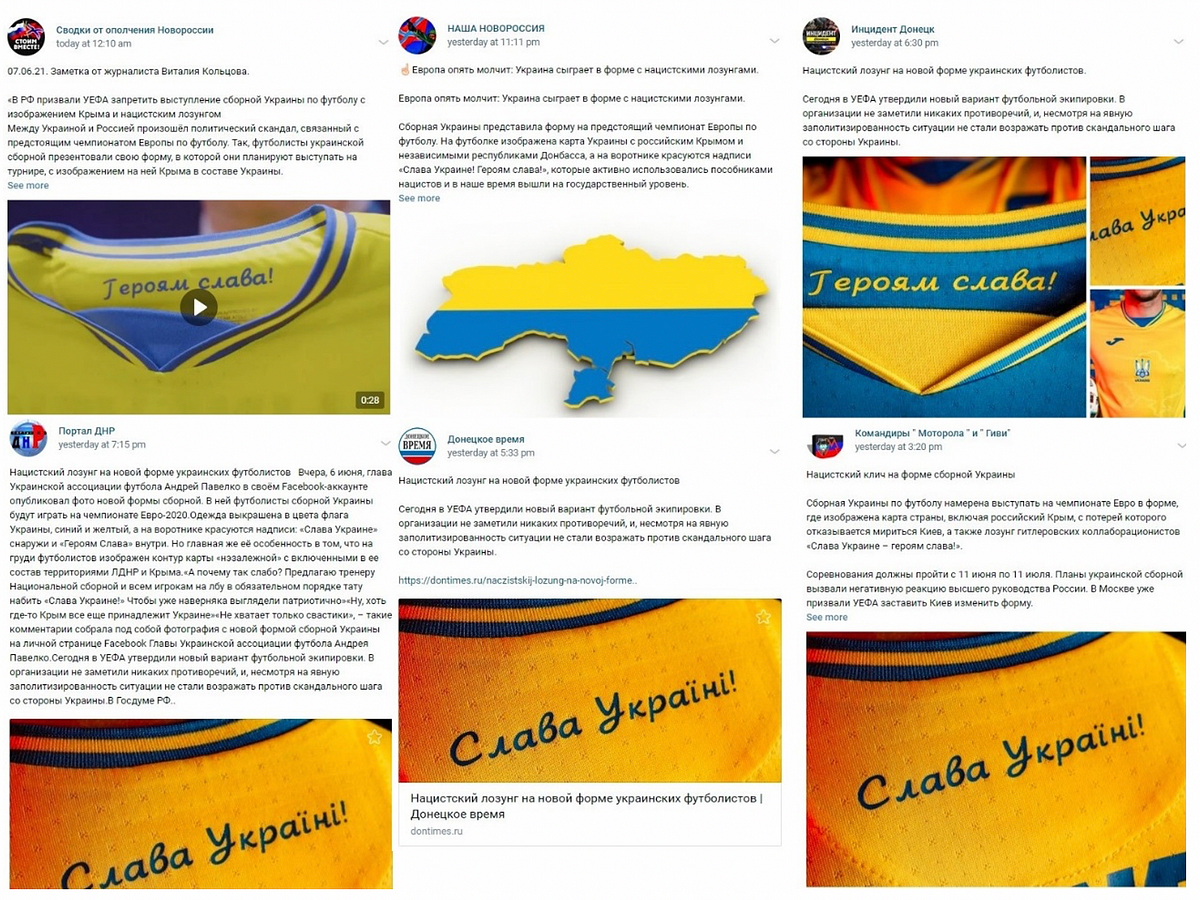New disinformation wave using old narratives came days before UEFA Euro 2021 kickoff

By Eto Buziashvili
Ukraine’s new national football kit featuring a map of Ukraine that includes Russian-annexed Crimea and a widely used Ukrainian slogan caused another wave of disinformation about the peninsula. Russian officials seized the opportunity to recycle long-circulated narratives over Ukraine, portraying the latter as “Nazi” and justifying the illegal annexation of Crimea. The narratives immediately started circulating on Russian media and the social network VK, accusing Ukraine of Russophobia as well.
The UEFA Euro 2021 football championship tournament runs from June 11 to July 11, 2021. Ukraine’s football association revealed Euro 2020 uniforms on June 6, 2021, days before the start of the European Championship. The shirts feature the map of Ukraine, including Russia-annexed Crimea. The shirts also included the slogan Slava Ukraini! Heroiam slava! (“Glory to Ukraine! Glory to the Heroes!”), a chant that dates back to the Ukranian independence movement of the 1920s and enjoyed renewed popularity during the 2014 Euromaidan street protests.
The Union of European Football Associations, Europe’s football governing body, told the BBC that the Ukrainian shirt “has been approved by UEFA, in accordance with the applicable equipment regulations.” According to UEFA kit regulations, elements must not “offend common decency or transmit political, religious or racial messages.”
Russia annexed Ukraine’s Crimea in 2014 — a move that a majority of the international community considered illegal. Kremlin officials and actors have been spreading various disinformation narratives around the topic ever since.
Russian officials: slogan is a Nazi rallying cry
According to the EU Neighbours portal, at least 200 disinformation cases have been documented in which the Kremlin and pro-Kremlin actors have associated Ukraine or Ukrainians with Nazis or fascists.
Following the reveal of Ukraine’s new football kit, Russian Foreign Ministry spokesperson Maria Zakharova stated that Ukraine is echoing a German Nazi rallying cry by featuring Slava Ukraini! Heroiam slava! on their national team shirts. According to Zakharova, Ukraine is creating the “illusion of the impossible” by “attaching Ukraine’s territory to Russian Crimea.”
Russian parliamentary deputy Dmitry Svishchev labeled the shirt design “a political provocation,” and claimed that a map of Ukraine “which includes a Russian territory is illegal.”
The chairman of the Council of the Federation Committee on Information Policy Alexei Pushkov stated that Ukraine featuring the outline of Crimea on its shirts is an “empty ploy.”
Meanwhile, Russian lawyer Igor Bushmanov warned that if the new shirt is worn by a Russian citizen, they first will be brought to administrative proceedings, and if they wear the shirt again, they will face criminal proceedings. According to Bushmanov, “public calls for the implementation of activities aimed at violating the territorial integrity of the Russian Federation” might be assessed as separatism.
Russian outlets react
After the statements made by Russian officials, the Russian online outlets have started circulating narratives about Ukraine being “Nazi” and comparing Slava Ukraini! Heroiam slava! to the Nazi salute, sieg heil. They have also claimed that under this slogan, “soldiers of the Ukrainian Armed Forces are fighting with civilians in Donbas,” the eastern part of Ukraine.

Other Russian outlets have been accusing Ukraine of Russophobia. The DFRLab has covered before how the Kremlin has weaponized the term “Russophobia” to justify the annexation of Crimea by calling its opponents “Russophobes” and accusing them of “anti-Russian hysteria.”
According to these articles, the introduction of the new football kit is a Russophobic attack and provocation from Ukraine; according to this logic, they write, Russia could also put Alaska on their shirts as a form of provocation.

Some pro-Kremlin outlets promoted a comment by Russian Duma member Dmitry Svishev, in which he accused the United States of provocation for supporting Ukraine. The U.S. embassy in Ukraine tweeted a photo of the new Ukrainian uniform, writing, “Love the new look. Glory to Ukraine!” Svishev compared the tweet to “a mosquito bite,” meaning it is unpleasant, but not particularly painful.
🇺🇦 Нам подобається нова форма. Слава Україні! #КримЦеУкраїна
🇺🇸 Love the new look. Glory to Ukraine! #CrimeaisUkraine pic.twitter.com/a6SOgsTvlz— U.S. Embassy Kyiv (@USEmbassyKyiv) June 7, 2021
Other Russian outlets have promoted a comment by former Russian footballer Igor Kolivanov, stating that Ukraine always belonged to Russia and that he would love to see Ukrainians wearing a Russian flag on their shirts.
Russian social media
Concurrent to Russian officials and media outlets, narratives accusing Ukraine of being Nazi-like have spread on the Russian social network VK by accounts identifying themselves as supportive of “Novorossya” — a term that was used by Russian President Vladimir Putin in 2014 as a means of demonstrating Russia’s sovereignty over Ukraine’s Donbas — and “DNR,” the self-proclaimed Donetsk People’s Republic. They accused UEFA of looking the other way to the “Nazi slogans” on Ukraine’s national kit. The engagement with the posts, however, was close to zero.

The case of the Kremlin disinformation campaign over Ukraine’s new football kit represents an illustrative example of how old disinformation narratives can be recycled and used in a new context over and over again.
Eto Buziashvili is a Research Associate, Caucasus, with the Digital Forensic Research Lab.
Cite this case study:
Eto Buziashvili, “Russian officials, media, and VK spread disinfo over Ukraine’s football uniform,” Digital Forensic Research Lab (DFRLab), June 17, 2021, https://medium.com/dfrlab/russian-officials-media-and-vk-spread-disinfo-over-ukraines-football-uniform-e5c03659cf79.
Follow along for more in-depth analysis from our #DigitalSherlocks.

